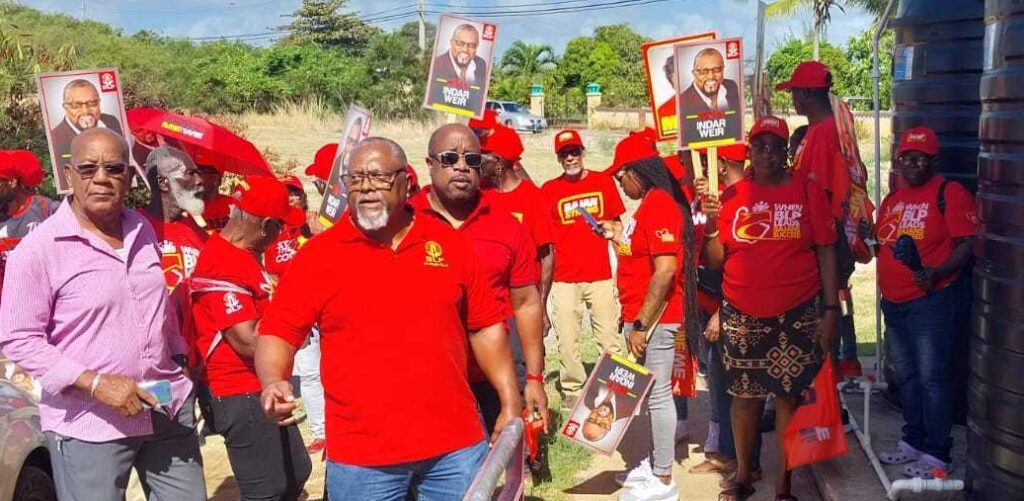A bold new package of judicial reforms, ranging from digitising court files to setting strict trial dates and retrying delayed appeals at the State’s expense, has won firm support from the acting attorney general, the president of the Barbados Bar Association and younger lawyers.
The measures, unveiled by Chief Justice Leslie Haynes at the opening of the 2025-26 legal year, form the centrepiece of efforts to modernise courts and finally address the chronic backlog of criminal cases.
Haynes announced a series of major measures to clear up the troublesome backlog of criminal cases, including the issuance of a new practice direction on trial date certainty, the implementation of a comprehensive technological upgrade of all courts, and the retrial of all pre-2020 Court of Appeal outstanding judgments at the expense of the State.
Responding to the chief justice’s speech in the No. 1 Supreme Court, Acting Attorney General Wilfred Abrahams told reporters the government has full confidence in the judicial system and judiciary.
Abrahams, who is also the minister of home affairs, said several changes have been made over the past year, with more to come.
He referred to a plethora of new legislation as indicated by the chief justice, dealing with the criminal justice system, measures to slash the backlog and adjustments to the Bail Act, all of which are intended to streamline the administration of justice.
The acting AG supported the chief justice’s assertion that for the court to function properly and efficiently, it must be modernised with new technology.
Abrahams said: “We cannot, in 2025, be running our judicial system and our justice system as if we were still in the 2000s or prior to the 2000s. Barbados has changed. The world has changed; standards have changed; we have to change with that. The chief justice also made the point in relation to [teleconferencing] and the capacity to monitor what’s happening in the courts, and even to broadcast out of there. We need to bring our judicial system and our infrastructure in line with modern best practices, and the government is committed to doing that.
“In relation to what the chief justice says about the backlog, we have seen the backlog coming down, but it is a significant backlog. And while the chief justice has pointed to some improvements made and some victories won, we are not yet out of the woods on that, and it has to be a concerted effort by all the players involved. So, the new initiative in relation to the certainty of trial dates is a good one.”
He continued: “Quite frankly, unless things do actually come off, then all we are going to be able to pick at are the ones that can be mitigated or negotiated or settled. You would always have some matters that are incapable of being settled for somebody who wants their day in court. For those who want their day in court for those matters that require nothing less than a day in court, then there must be certainty, and they must be able to have their day in court, and a judgment given and a judgment rendered.”
Abrahams expressed his comfort with what the CJ said about the previous legal year and his hopes for the new year.
“The government, as it always has, is prepared to support the judiciary and the legal justice system, to give it what it needs to become that pillar and that exemplar for the rest of the Caribbean,” Abrahams said.
The acting attorney general also responded to the challenge thrown out to the administration to prioritise funding for the judiciary.
He said: “Everything the police asked for recently, everything the judicial system has asked for recently, they have gotten from the government. We have put our money where our mouth is. We have stepped up to say, ‘yes, we accept that things don’t happen by serendipity’ . . . that you have to invest money and upgrade our systems in order to get the results that you want.”
He continued: “I don’t see this as being any different. Once the judicial system justifies what it is asking for, I don’t see the government saying to it, ‘no’, especially when there are clear reasons for developing the infrastructure; there are clear reasons for technological advancements, and that at the end of the day, it has produced the most efficient system possible. Then, yes; once that can be justified and the money can be seen to be going towards something better, then I don’t see that they are going to have a problem.”
Abrahams fully backed the call by the chief justice and the commissioner of police for the digitisation of files, saying that it is “an initiative whose time has come, gone and probably on to something else”. He said the government has been pushing for digitisation across the entire public service.
He told reporters: “We are at the stage of AI now, which is a good thing and a bad thing. But, if we are at that stage, we cannot be [going] back to the way in which we kept our records 200 years ago or a hundred years ago. At some point, you are going to run out of space. At some point in time, there is going to be a fire and they are going to burn. At some point in time, somebody is going to steal one and keep it.
“The principal form of record-keeping, the days of moving a file from department to department, have to come to an end. We are in an instantaneous age. If I want something from you, I should be able to get it immediately. It should be easy to find, it should be properly catalogued, it should be certain as to where it is kept, and it should be free from those who wish to do it mischief.”
The chief justice’s reform package received a thumbs up from the Barbados Bar Association (BBA).
President Kaye Williams told reporters: “The Barbados Bar Association welcomes the initiatives which were stated by the chief justice. For over a decade, we were calling for a systematised way in dealing with the delays and backlogs in the court system across all courts.
Williams noted that the CJ laid out five systematic ways in which the delays are being addressed.
She said: “The chief has the full support of the Barbados Bar Association, because, at the end of the day, it is the public that we serve; and at the end of the day, attorneys-at-law must come on board with the initiatives . . . the digitisation, the trial date certainty, and all the other systems that have been put in place in order for trial dates to be set and things to be heard, and matters to be disposed of in an efficient way.”
She also reported that the delays in the timely delivery of decisions by judges were showing improvements in recent times.
She said lawyers have also noted the improvements.
“We found that over the last year and a half, two years, we also have older decisions being delivered; and that in the current system, where possible, judges have been sticking to that six-month period for the delivery of decisions,” she revealed.
The Bar president also agreed with the chief justice on the need for an electronic system of ticketing for traffic offenders to reduce the backlog, bearing in mind that of the 20 000 outstanding overall cases, 15 000 are traffic-related.
Shamora Scott-Springer, who has been practising law here for the past five years, also backed Haynes’s initiatives, particularly on digitisation.
“The honourable chief justice has tried his best to give us hope,” she told Barbados TODAY on the steps of the Supreme Court. “As attorneys at law, we are faced with a lot of challenges, and one of the things that he had mentioned was the need for incorporating more technology into what we do; and I think that would make our jobs more efficient.”
She also focused on planned changes to forms of address in court: “I particularly like the fact that he is embracing the fact that we are in a republic, and so titles such as ‘Milord’ and ‘Milady’ will no longer be used. He said that we will now be using ‘Your Honour’ moving forward.”
Scott-Springer, who has a master’s in corporate and commercial law, noted that while she is currently focused on litigation, also called on fellow attorneys to improve their own skills.
“I am more passionate about advocacy, particularly written and oral advocacy,” she said. “A lot of times people think that when lawyers go to court, it’s all about talking, but I think that as attorneys at law, we need to hone our writing skills as early as possible because most of our arguments are won even before we get to court.”
The new legal year began for the first time with an ecumenical service that embraced the Christian, Jewish, Muslim and Hindu faiths at the Anglican St Michael’s Cathedral, which has remained the site of the new law year’s service even after the church was disestablished in 1969.
The service, with traditional pomp and ceremony, was held under the theme Walking Together: Human Life and Civic Responsibility.
President of Barbados Sandra Mason, the chief justice, the acting attorney general, Acting Commissioner of Police Erwin Boyce joined with members of the Bench and the Bar at the service.
Both the chief justice and the home affairs minister expressed delight that other faiths were represented at the service.
At the end of the service, the dignitaries were driven to the Supreme Court Complex on Whitepark Road, where the head of the judiciary inspected a guard of honour comprising an armed detachment and the band of The Barbados Police Service.
emmanueljoseph@barbadostoday.bb
The post Chief justice’s sweeping court reforms win broad backing appeared first on Barbados Today.


